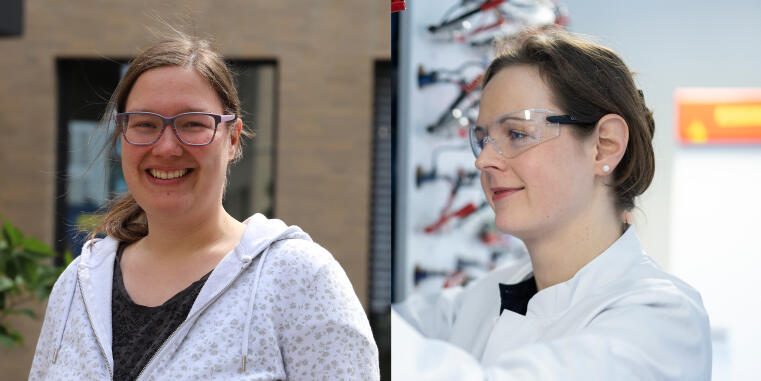Female Role Models as Inspiration
Women are underrepresented in science worldwide. This is especially true for the forward-looking STEM subjects – science, technology, engineering and mathematics. This is highlighted by the “International Day of Women and Girls in Science” on February 11th, which was initiated by UNESCO in 2015. Dr Katrin Junghans, Research Associate at MEET Battery Research Center at the University of Münster, and Dr Annika Buchheit, Research Associate at Helmholtz Institute Münster (HI MS; IEK-12) of Forschungszentrum Jülich, report on opportunities and challenges for female scientists and answer the question of helpful hints in scientific career planning.
Why did you choose to do research on batteries?
Katrin Junghans: I picked up electrotechnology at home. Even in elementary school, I knew how much voltage each high-voltage pylon conducted. I was enthusiastic about all the natural sciences at school. After my chemistry teacher further stimulated my curiosity, I decided to study chemistry. I then pursued my PhD studies in Dresden. After a brief period in industrial research, I moved to Münster to work in academic research at MEET Battery Research Center – and I never regretted this decision. Not only because there are so many different aspects within the field of battery research, but also because I really took my colleagues to my heart.
Annika Buchheit: I actually did a bilingual German university entrance qualification with a focus on English. I was interested in chemistry from an early age, but my school did not offer an advanced course. This was never a disadvantage for me. Even with the basic course, I was well prepared for studying chemistry. I then pursued my PhD studies at the University of Münster. During this time, I was focusing on electrochemistry. However, as the basic principles are the same as those in battery research, the career step to Helmholtz Institute Münster was exactly the right one for me.

What advice do you give to pupils and students who decide to pursue a study or a career in chemistry?
Katrin Junghans: During my time at school, I had the privilege to take part in a wide variety of events that have given pupils insights into natural sciences. I have vivid memories of the annual Long Night of Science, a summer university or a student college. Take advantage of such opportunities to get your first glimpse of laboratory work. The study of chemistry itself is wide-ranging. So, try out a lot at the beginning to find out exactly what you enjoy. It is not easy to decide which career path suits you best.
Annika Buchheit: Networking is incredibly important. Attend every conference that could be interesting for you. It does not always have to be a conference specifically on battery research. Since I worked in electrochemistry and optical processes during my PhD studies and not specifically in battery research, I often have a different view on specific topics than my colleagues. Be open to perspectives from other areas as well.
Research potential worldwide is not yet fully exploited because there are still too few highly qualified women working in research. How can this situation be changed?
Katrin Junghans: Having good role models helped me immensely. I was particularly inspired by my doctor of electrochemistry at the University of Freiberg. She supported and encouraged me and my passion for research. I am very grateful for that. It is also important that natural science remain sufficiently on the school curriculum. Another fundamental topic is support for pregnant women and parents. At MEET, I was fortunate to have a colleague at my side during my pregnancy who took over my laboratory measurements. This allowed me to continue my research during my pregnancy.
Annika Buchheit: With regard to family planning, security is very important. In academia, contracts are often project-based and therefore run for the period announced for the project. This applies to all genders – and does not just affect family planning. Fixed-term employees also have disadvantages in financing the construction of a house, for example. For many, this security is therefore essential for planning their future. In this regard, science must become more attractive to recruit not only, but especially, women.
What do you wish for the future regarding women and girls in science?
Annika Buchheit: It is precisely this security and more freedom for individual pathways. For example, there cannot be one set path when a female scientist becomes pregnant. Some can continue to conduct measurements on their own because no chemicals are used in their laboratories. Others need much more support because they can no longer do exactly this. In my view, openness, communication and freedom for individual paths are crucial factors.
Katrin Junghans: That the debate about equality needs to be conducted less intensively because equality has become standard. For me, this means that skills and career paths are evaluated regardless of gender. There should be neither favoritism nor unfairness – for either gender.

